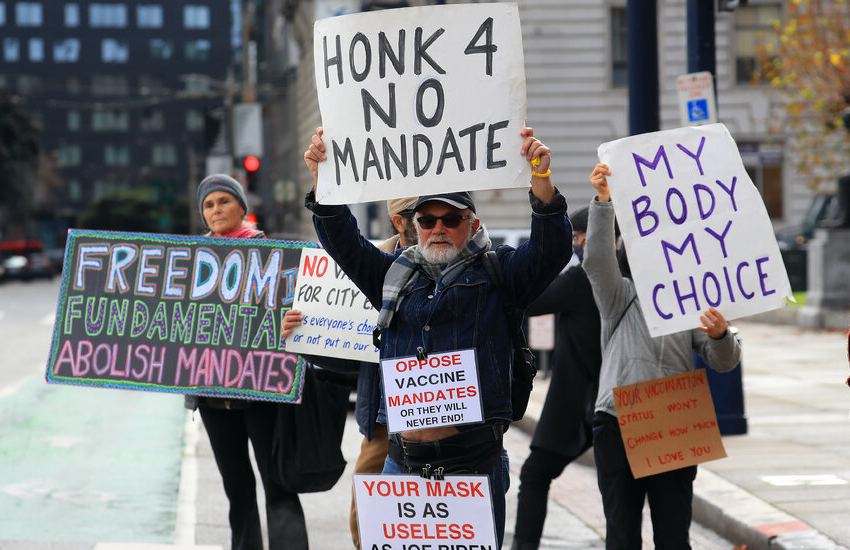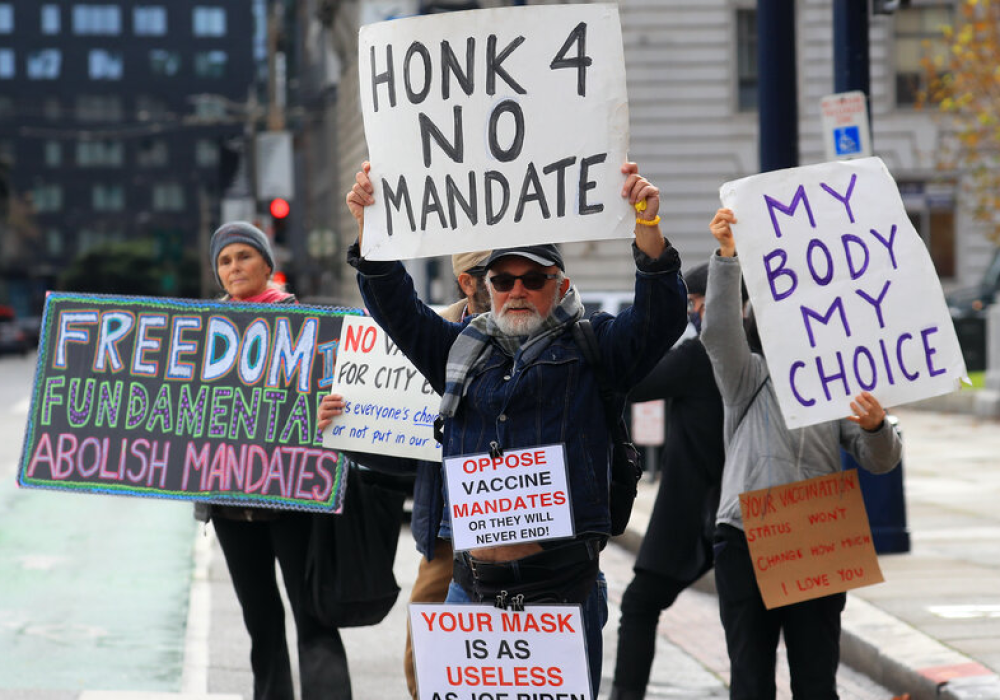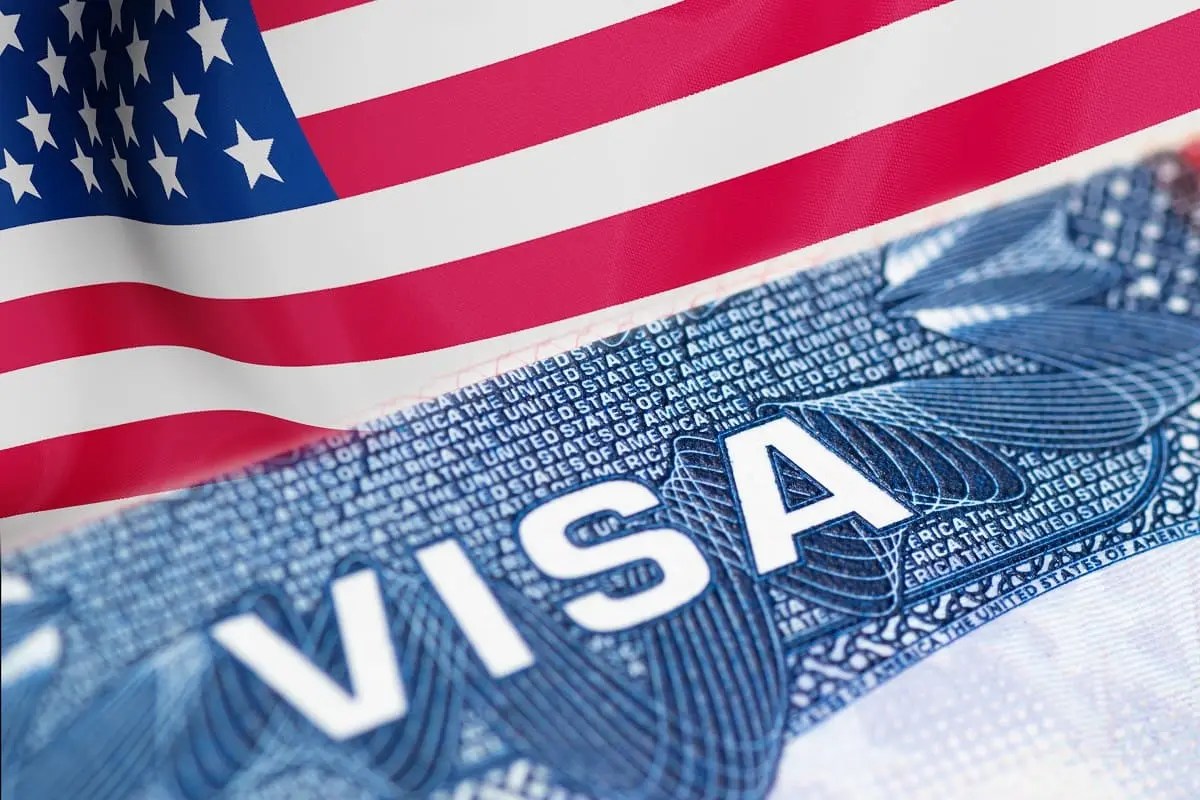WASHINGTON — The Supreme Court on Thursday blocked the Biden administration from enforcing a vaccine-or-testing mandate for large employers, dealing a blow to a key element of the White House’s plan to address the pandemic as coronavirus cases resulting from the Omicron variant are on the rise.
But in a modest victory for President Biden, the court allowed a more limited mandate requiring health care workers at facilities receiving federal money to be vaccinated.
The vote in the employer mandate case was 6 to 3, with the liberal justices in dissent. The vote in the health care case was 5 to 4, with Chief Justice John G. Roberts Jr. and Justice Brett M. Kavanaugh joining the liberal justices to form a majority.
The employer decision undercut one of President Biden’s most significant attempts to tame the virus and left the country with a patchwork of state laws and policies, largely leaving companies and businesses on their own.
The president welcomed the ruling in his favor, saying in a statement that it would save the lives of health care workers and patients. But he said he was disappointed that the court had overturned the employer mandate, which he said was “grounded squarely in both science and the law.”
In both the employer and health worker cases, the justices explored whether Congress had authorized the executive branch to take sweeping actions to address the health care crisis.
The unsigned majority opinion in the employer case said a statute on workplace hazards did not justify a mandate that would have required more than 80 million workers to be vaccinated against the coronavirus or to wear masks and be tested weekly. It also stressed the novelty and sweep of the mandate issued by the Labor Department’s Occupational Safety and Health Administration, or OSHA, saying Congress had not authorized the agency to act and describing its response as “a blunt instrument.”
The mandate “draws no distinctions based on industry or risk of exposure to Covid-19,” the majority opinion said, adding that it was “a significant encroachment into the lives — and health — of a vast number of employees.”
But the opinion said more tailored regulations may be lawful given that “most lifeguards and linemen face the same regulations as do medics and meatpackers.”
In a dissenting opinion, Justices Stephen G. Breyer, Sonia Sotomayor and Elena Kagan expressed incredulity at the court’s willingness to frustrate “the federal government’s ability to counter the unparalleled threat that Covid-19 poses to our nation’s workers.”
Regulating safety in the workplace, the three dissenting justices wrote, is precisely what OSHA is commanded to do.
They agreed that the key issue in the case was that of institutional competence to address the health care crisis.
“Underlying everything else in this dispute,” they wrote, “is a single, simple question: Who decides how much protection, and of what kind, American workers need from Covid-19? An agency with expertise in workplace health and safety, acting as Congress and the president authorized? Or a court, lacking any knowledge of how to safeguard workplaces, and insulated from responsibility for any damage it causes?”
Jan. 13, 2022, 9:06 p.m. ET
The wiser course, they wrote, would have been to defer to OSHA.
“In the face of a still-raging pandemic, this court tells the agency charged with protecting worker safety that it may not do so in all the workplaces needed,” the dissenters wrote of the majority’s actions in the case, National Federation of Independent Business v. Department of Labor, No. 21A244. “As disease and death continue to mount, this court tells the agency that it cannot respond in the most effective way possible.”
OSHA issued the mandate in November, making exceptions for workers with religious objections and those who do not come into close contact with other people at their jobs. The administration estimated that it would cause 22 million people to get vaccinated and prevent 250,000 hospitalizations.
The ruling means that companies across the country must now decide between protecting employees, potentially losing staff members resistant to complying and running afoul of patchwork regulations.
Several major companies, like United Airlines and Tyson Foods, already have mandates, while others had held back and waited for legal battles to be resolved. Some companies have been anxious about losing employees at a time when workers are already scarce. While firms with mandates have said those worries largely have not come to fruition, a national requirement could have helped ease those concerns.
Walmart, Amazon and JPMorgan Chase, three of the largest employers in the United States, have yet to issue broad requirements for their workers. Some companies that have waited have cited concerns about the costs of setting up testing programs and pushback from unvaccinated employees.
That second mandate applies to workers at hospitals and other health care facilities that participate in the Medicare and Medicaid programs.
The Coronavirus Pandemic: Key Things to Know
Vaccine mandates. The Supreme Court blocked the Biden administration from enforcing a vaccine-or-testing mandate for large employers, but the justices allowed a more modest mandate requiring health care workers at facilities receiving federal money to be vaccinated.
Around the world. The future of British Prime Minister Boris Johnson is in doubt after he admitted attending a party that violated lockdown rules. In France, teachers staged a one-day walkout against relaxed Covid testing rules that they fear will lead to more infections.
Federal judges in Missouri and Louisiana had blocked the requirement, which has exemptions for people with medical or religious objections, in rulings that applied in about half of the states. It will now go into effect nationwide.
In an unsigned opinion in the case, Biden v. Missouri, No. 21A240, the majority wrote that the health care mandate issued by the secretary of health and human services “falls within the authorities that Congress has conferred upon him.”
The governing statute gives the secretary the general power to issue regulations to ensure the “efficient administration” of the Medicare and Medicaid programs, and parts of the statute concerning various kinds of facilities generally also authorize the secretary to impose requirements to protect the health and safety of patients.
The majority wrote that the mandate “fits neatly within the language of the statute.”
The majority added that facilities that receive money from the Medicare and Medicaid programs must comply with many federal health and safety requirements.
“All this is perhaps why health care workers and public health organizations overwhelmingly support the secretary’s rule,” the majority wrote. “Indeed, their support suggests that a vaccination requirement under these circumstances is a straightforward and predictable example of the ‘health and safety’ regulations that Congress has authorized the secretary to impose.”
In dissent, Justice Clarence Thomas, joined by Justices Samuel A. Alito Jr., Neil M. Gorsuch and Amy Coney Barrett, wrote that “scattered provisions” in the statute did not justify the mandate.
Without “exceedingly clear” congressional authorization, Justice Thomas wrote, the federal government should not be allowed to force health care workers “to choose between losing their livelihoods and acquiescing to a vaccine they have rejected for months.”
“These cases are not about the efficacy or importance of Covid-19 vaccines,” he wrote. “They are only about whether” the agency “has the statutory authority to force health care workers, by coercing their employers, to undergo a medical procedure they do not want and cannot undo.”
The Supreme Court has repeatedly upheld state vaccine mandates in a variety of settings against constitutional challenges. The two cases decided on Thursday concerned a different question, that of whether Congress has authorized the executive branch to institute the requirements.
The majority opinion in the case on health care workers seemed to try to harmonize the two rulings.
“The challenges posed by a global pandemic do not allow a federal agency to exercise power that Congress has not conferred upon it,” the opinion said. “At the same time, such unprecedented circumstances provide no grounds for limiting the exercise of authorities the agency has long been recognized to have.”
Emma Goldberg and Lauren Hirsch contributed reporting.











